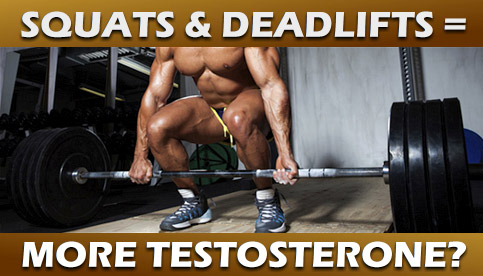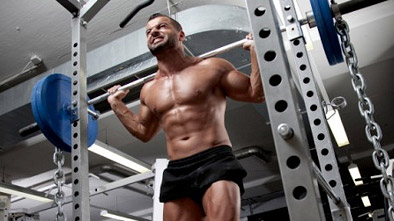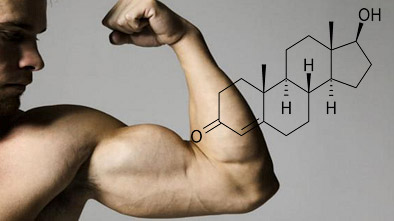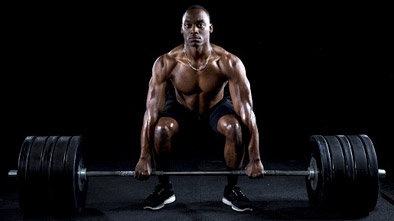DO SQUATS AND DEADLIFTS INCREASE TESTOSTERONE LEVELS?

Do squats and deadlifts increase testosterone levels?
This “old-school” bodybuilding concept has been around for quite some time and goes something like this:
- Squats and deadlifts are two of the most challenging exercises you can perform in the gym and train multiple large muscle groups at the same time while allowing you to handle very large amounts of weight.
- Because of the high level of stress these lifts place your body under, greater amounts of testosterone will be released during your workout.
- As a result, you’ll experience improved gains throughout your entire body since testosterone is the primary anabolic hormone involved in building muscle.
But is this whole idea that “squatting builds your biceps” really true, or have the hormone releasing effects of these exercises been over-exaggerated?
Let’s go over it…
Do Squats Make Your Biceps Bigger?

There’s no question that heavy resistance training does lead to an increase in overall testosterone levels, and this is something that has been studied extensively with fairly clear results.
In addition, it’s well established that bigger, more challenging compound exercises do increase those levels to a higher degree in comparison to smaller, less challenging isolation exercises.
However, it’s important to understand that merely “increasing testosterone levels” in and of itself does NOT automatically mean that those increases are going to translate to greater muscle growth.
That’s because in order for increases in testosterone to have any measurable impact on muscle hypertrophy, those levels must be elevated by a very large percentage and then sustained over a prolonged period of time in order to take effect.
When it comes to the hormonal changes that result specifically from resistance training, it’s only acute, temporary spikes that are produced which then fall back to baseline fairly quickly.
So even though a barbell squat may produce a larger temporary increase in testosterone in comparison to a leg press (and the research does in fact demonstrate that to be the case), it’s still highly unlikely that the increase would be significant enough to carry over and produce more total body muscle growth as a result.
You might experience greater gains in your lower body from performing squats simply because it’s a superior leg exercise in terms of actual muscle stimulation, but it most likely has nothing to do with anabolic hormone levels specifically.
Short term fluctuations in testosterone are completely normal and can range anywhere from 10-40% over periods of a few days or weeks, and these modest up and down spikes are not significant enough to positively or negatively impact your gains in the overall picture.
This is why, as I’ve talked about many times before, “natural testosterone boosters” that provide small temporary increases are virtually worthless when it comes to increasing muscle growth.
When we take a look at the actual research that has been conducted on how certain exercises or training protocols influence hormone levels and bottom line muscle growth, this is basically what we see.
There’s either no connection at all, or only a modest connection with weak correlation…
- Resistance exercise-induced increases in putative anabolic hormones do not enhance muscle protein synthesis or intracellular signalling in young men.“We conclude that the transient increases in endogenous purportedly anabolic hormones do not enhance fed-state anabolic signalling or MPS following resistance exercise. Local mechanisms are likely to be of predominant importance for the post-exercise increase in MPS.”
- Elevations in ostensibly anabolic hormones with resistance exercise enhance neither training-induced muscle hypertrophy nor strength of the elbow flexors.“We conclude that exposure of loaded muscle to acute exercise-induced elevations in endogenous anabolic hormones enhances neither muscle hypertrophy nor strength with resistance training in young men.”
- Muscular and systemic correlates of resistance training-induced muscle hypertrophy. “Post-exercise increases in circulating hormones are not related to hypertrophy following training.”
- The effect of short-term strength training on human skeletal muscle: the importance of physiologically elevated hormone levels.“In conclusion, a larger relative increase in isometric strength was found in the group having the highest hormonal response. However, due to the initial difference in isometric strength caution must be taken with the interpretation of this finding, which may only indicate a possible link between anabolic hormones and muscle strength with training.”
Training To Manipulate Hormone Levels Is A Waste Of Time

When it all comes down to it, this whole “do squats increase testosterone” or “do deadlifts boost testosterone” question just isn’t something that has any practical use for you.
Based on the research, it’s fairly safe to say that muscle growth is primarily a localized event that happens at the level of the specific muscles being trained rather than being a “carry over” result from increases in anabolic hormone levels.
In other words:
- If for some reason you can’t or don’t want to perform squats or deadlifts as part of your training routine, you’re likely not missing out on anything important when it comes to raising testosterone.
- If you are performing squats and deadlifts in your workouts, there’s no need to go out of your way to do them more often or with greater volume just for the sake of trying to influence hormone levels.
It’s possible that this could have some very minor application for very high level bodybuilders who are trying to squeeze out every single ounce of muscle growth they can over the long term (though I can’t even say that for sure), but for the average lifter it’s just not something to worry about.
The benefits of squats and deadlifts are obviously well established when it comes to building overall muscle mass and strength, but they don’t possess any “magical” testosterone boosting effects that are going to pack additional size onto your chest, shoulders or arms like so many people claim.
For a good anecdotal example of this, just take a look at all those guys you see strutting around the gym with huge, ripped upper bodies who appear as though they’ve never set foot in a squat rack a day in their entire lives.
The key takeaway here is that trying to structure your training program around the specific goal of manipulating hormone levels (whether it be testosterone, growth hormone or IGF-1) is just not going to be a wise use of your effort.
You’ll only be dealing with modest intermittent spikes at best that are highly unlikely to alter your overall body composition in the bigger picture.
Could the highly challenging nature of these exercises produce a temporary boost when it comes to overall mood, libido or energy as a result of that small testosterone spike?
Surely that’s possible, but from a pure muscle building perspective there likely isn’t going to be any noticeable connection.
Squats, Deadlifts & Testosterone: The Bottom Line

The average testosterone level for males (according to LabCorp) is somewhere between 348 to 1197 ng/dl (nanograms per decilitre), and the only way to increase those levels into a supraphysiological range that would measurably increase total body muscle growth is through the actual use of synthetic testosterone or other anabolic hormones.
However, trying to reach that high a level by relying on specific exercises, training protocols, rest periods or even certain foods, supplements or lifestyle choices is almost certainly not going to get the job done when it comes to significantly improving muscle hypertrophy.
I’m certainly not encouraging the use of steroids as I truly don’t believe that “chemical enhancement” is a wise decision for the vast majority of lifters, but this is simply the reality when it comes to the issue of testosterone and muscle growth.
If you’re trying to maximize your size and strength gains, just place all of your focus on maintaining a properly balanced program in terms of volume, frequency, intensity and exercise selection, strive for progressive overload from week to week, and then let the hormonal aspect take care of itself.
If you found this article helpful, make sure to sign up for your FREE custom fitness plan below...




